 MyDogBreeds
MyDogBreeds Ibizan Hound is originated from Spain but Border Collie is originated from United Kingdom. Ibizan Hound may grow 18 cm / 8 inches higher than Border Collie. Ibizan Hound may weigh 9 kg / 20 pounds more than Border Collie. Ibizan Hound may live 5 years less than Border Collie. Ibizan Hound may have more litter size than Border Collie. Ibizan Hound requires Low maintenance. But Border Collie requires Moderate maintenance
Ibizan Hound is originated from Spain but Border Collie is originated from United Kingdom. Ibizan Hound may grow 18 cm / 8 inches higher than Border Collie. Ibizan Hound may weigh 9 kg / 20 pounds more than Border Collie. Ibizan Hound may live 5 years less than Border Collie. Ibizan Hound may have more litter size than Border Collie. Ibizan Hound requires Low maintenance. But Border Collie requires Moderate maintenance
 This lean, speedy and agile hound dog looks and acts very much like a Pharaoh Hound except the Ibizan Hound is larger and a different color. The image of dogs that look like the Ibizan have been seen since 3400 BC in Egypt. The dogs were probably brought by sailors to Ibiza and surrounding islands. They came about 700-900 BC. It is believed that they actually came for the island of Elvissa and Spain, where they speak Catalan. It was also known in France as the le chanigue. There job was the same. To hunt rabbits.
This lean, speedy and agile hound dog looks and acts very much like a Pharaoh Hound except the Ibizan Hound is larger and a different color. The image of dogs that look like the Ibizan have been seen since 3400 BC in Egypt. The dogs were probably brought by sailors to Ibiza and surrounding islands. They came about 700-900 BC. It is believed that they actually came for the island of Elvissa and Spain, where they speak Catalan. It was also known in France as the le chanigue. There job was the same. To hunt rabbits.
They were fast hunting greyhound type dogs. They hunted for rabbit for the Ibizaners and themselves. These dogs hunt by day and by night. They are not just sight hounds, they also hunt by smell and hearing, in packs or by themselves. They use their sight to find and corner the prey. Then they act like retrievers and bring it back to the hunter. Their function and look is very similar to several other dogs such as the Pharaoh Hound, the Greyhound, the Portuguese Podengo, the Cimeco dellEtna and the Podence Canario. The Ibizan is larger than any of these, but all these breeds are considered to be “primitive”.
Within the breed itself there are smooth, wire and longhaired Ibizan Hounds. The Smooth is by far the most common. A great jumper, nimble runner built for stamina, the Ibizan Hound was just what the island people needed. The breed lived in isolation on the island for many centuries, under a variety of rulers including the Romans, Egyptians, Vandals, Carthaginians, Chaldeans, Arabs and Spanish. Because of the harsh island conditions, the farmers only allowed the best hunters among the Ibizan Hounds to procreate thus assuring a breed that is unchanged from ancient stock.
By 1950 the Ibizan Hound was brought to America. Because this dog is not a pet but a working machine, it took awhile for the breed to become popular enough to be recognized by the American Kennel Club (AKC) in 1979. Still the Ibizan Hound is a rare breed with the female being a better hunter than the male. One of the most common activities of this breed in the U.S. is lure coursing. These events are sponsored by AKC and ASFA as well as racing events in the NOTRA and LGRA.
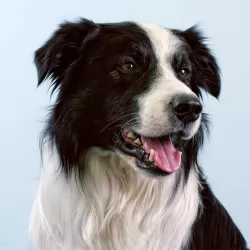 The Border Collie originated in Northumberland and was used to herd livestock. He is particularly well known for his intense stare in controlling the sheep in his care. The name Border Collier wasn’t used until 1915. This was so that the dog could be registered as a separate breed together with other Collie breeds already registered.
The Border Collie originated in Northumberland and was used to herd livestock. He is particularly well known for his intense stare in controlling the sheep in his care. The name Border Collier wasn’t used until 1915. This was so that the dog could be registered as a separate breed together with other Collie breeds already registered.
Sheepdog trials have been held since 1873. The very name of this dog gives you an inkling as to his heritage, as the word ‘Collie’ refers to sheepdogs and comes from Scottish dialect. Today the Border Collie is recognized as the ultimate sheep-herding dog, with his amazing intelligence and herding skills. The Border Collie was recognized by the American Kennel Club in October 1995.
 The breed is agile, elegant, athletic and graceful. At the same time the Ibizan Hound is a fierce hunter travelling at unreal speeds to catch his rabbit prey. They are a hardy breed with a lean and long neck, and a lean, muscled body with laid back shoulders. The ears are specific to the breed, with a broad base leading to long, beautiful ears. They have tan eye rims, nose, foot pads, and ears. The eyes themselves are an amber with an intelligent and alert expression.
The breed is agile, elegant, athletic and graceful. At the same time the Ibizan Hound is a fierce hunter travelling at unreal speeds to catch his rabbit prey. They are a hardy breed with a lean and long neck, and a lean, muscled body with laid back shoulders. The ears are specific to the breed, with a broad base leading to long, beautiful ears. They have tan eye rims, nose, foot pads, and ears. The eyes themselves are an amber with an intelligent and alert expression.
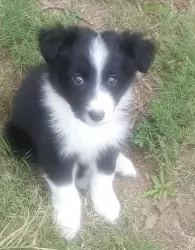 Utterly responsive, intelligent, alert and keen, the medium sized border collie loves nothing more than to be actively working. He requires both mental and physical stimulation. The ideal height for this very intelligent dog is 46 – 53cm and they weigh in at about 14 – 22kg.
Utterly responsive, intelligent, alert and keen, the medium sized border collie loves nothing more than to be actively working. He requires both mental and physical stimulation. The ideal height for this very intelligent dog is 46 – 53cm and they weigh in at about 14 – 22kg.
People who have been to sheepdog trials can only marvel a this dog and his intense stare, moving the sheep to precisely where his master wants them. The dog has a moderately long and smooth coat with a dense topcoat, with soft weather resistant undercoat. Most common color is black and white but other colors such as chocolate and white, liver and white or blue merle are also seen.
There are a few Border Collies which have a single-colour coat. He has a long feathery tail and the ears can be either erect, semi-erect and in some instances, even dropped. He has brown eyes but sometimes with the Merle Border Collie you can get one eye or part of the eye which is blue.
Border Collies are playful, energetic dogs who just love living in homes where the family involves him in all their activities. Because he is so intelligent, he is demanding of his human family, wanting them to take notice of him and provide him with lots of clever games and sports. If he is left without involvement, he can become frustrated and destructive. That is why it is so important to choose your pet carefully.
These highly energetic dogs require owners who recognize this need and are prepared to provide him with lots of games, walks and runs.
 They love children but be careful they do not knock them over and don’t let the children play to rough.
They love children but be careful they do not knock them over and don’t let the children play to rough.
Exceptional jumping ability, speed and stamina.
Must have a large fenced yard and a place to run full out.
Very intelligent with excellent learning ability.
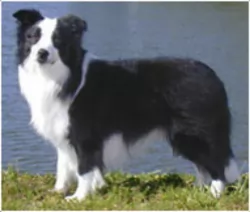 The Border Collie is such an awesome working dog breed, being of tremendous help to farmers. With their endless energy and stamina, given the chance he would want to be working all day. This medium sized dog will need a family where they are hard working and active just like him. He makes a wonderful pet with the right owners and if everyone is active in the family, he becomes your devoted soulmate.
The Border Collie is such an awesome working dog breed, being of tremendous help to farmers. With their endless energy and stamina, given the chance he would want to be working all day. This medium sized dog will need a family where they are hard working and active just like him. He makes a wonderful pet with the right owners and if everyone is active in the family, he becomes your devoted soulmate.
He is sensitive to what his owner wants and that is also because he is highly intelligent. Shower your wonderful pet with lots of love, give him lots of attention and plenty of activities, and you’ll have an awesome friend for life.
 Despite being isolated on the islands for all those years, the Ibizan Hound has several tendencies toward medical issues:
Despite being isolated on the islands for all those years, the Ibizan Hound has several tendencies toward medical issues:
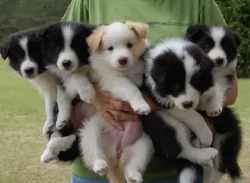 If your Border Collie is healthy, he can live to be 14 years of age and longer. There are one or two dog ailments that are more common in this breed, so it is wise to be aware of what can go wrong, although with good care it is highly unlikely.
If your Border Collie is healthy, he can live to be 14 years of age and longer. There are one or two dog ailments that are more common in this breed, so it is wise to be aware of what can go wrong, although with good care it is highly unlikely.
Primary epilepsy, known as idiopathic epilepsy can be seen in your dog before the age of 5 years, and although a genetic link in border collies has not yet been identified, idiopathic epilepsy is more prevalent in some breeds. Seizures in your dog are caused by electrical disturbances in the brain and treatment may be for life. While epilepsy in dogs can’t be cured, the condition can be managed with medication recommended by your vet and then he can lead a healthy life.
Collies are prone to developing hip dysplasia, which is an inherited condition with abnormal formation of the hip socket. For your pet it can mean lameness as well as painful arthritis. You’ll see your collie dog battling to rise after lying down. It is actually common in lots of dog breeds, but more so in larger breeds.
This is an inherited problem that can lead to your dog going blind. About 70 to 97% of collies in the UK and the United States are affected. Your veterinarian will examine your dog to determine the extent of the defect. It is common in the first year of a dog and can be be prevented if caught early.
 Your Ibizan Hound is an athlete and needs to be fed like one. As a puppy he needs high quality breed or group (hound) specific food. Feed her 3-4 times a day based on calories. A puppy needs about 866 calories each day.
Your Ibizan Hound is an athlete and needs to be fed like one. As a puppy he needs high quality breed or group (hound) specific food. Feed her 3-4 times a day based on calories. A puppy needs about 866 calories each day.
If your dog participates in sports as adults, they need between 1450 and 2900 calories each day. The exact amount depends on how much activity the dog is engaged in. Feed at least 2 times a day.
Great speed and stamina
Your Ibizan Hound is a working athlete. He needs a lot of exercise and he needs a chance to run full out so access to land is essential. It can be a large back yard, or it can be a dog park. No matter what it is, it is essential for the Ibizan Hound. She will also require long walks at least a couple times a day. However, do not over exercise your puppy. They are great jumpers as well as runners.
The sport of lure coursing was made for the Ibizan in the same way that it was made for the Greyhound. They are good at Flyball and agility as well.
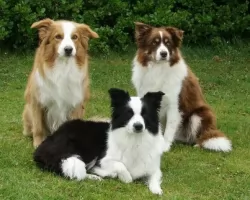 This is a dog that will need plenty of exercise and attention. He won’t do well cooped up in a tiny home. He’ll want lots of place to run and play and with his owners involved in his activities. It is unfair of any dog owner to buy a dog like this and then leave him so that he becomes distressed from being ignored.
This is a dog that will need plenty of exercise and attention. He won’t do well cooped up in a tiny home. He’ll want lots of place to run and play and with his owners involved in his activities. It is unfair of any dog owner to buy a dog like this and then leave him so that he becomes distressed from being ignored.
Do your dog a favor and see that he is socialized as a puppy and trained as he grows older. Once he has been trained, he becomes a super pet, obedient, sensitive and willing to please.
Border collies shed throughout the year, and with Summer his shedding becomes a bit more. He will require a good brushing at least twice a week to get rid of loose hairs and to ensure that the long hair doesn’t become tangled. He isn’t considered hypoallergenic and is regarded as a safe pet to have for people with allergies.
This high energy working dog will require top quality food from the top brands if you intend feeding him from commercially produced dog food. He will certainly need raw meat added to this food from time to time to ensure you stave off skin problems such as rashes. You can also add in rice, meat and vegetables for variety to ensure his is getting in all the minerals and vitamins he needs. Fresh, cool water should always be available to him day and night.